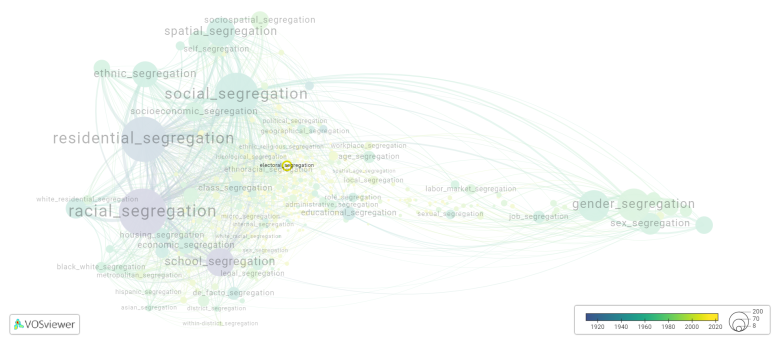Electoral segregation: Difference between revisions
(Creating page) |
(Creating page) |
||
| (9 intermediate revisions by the same user not shown) | |||
| Line 1: | Line 1: | ||
===== Date and country of first publication<ref>Date and country of first publication as informed by the Scopus database (December 2023).</ref>===== | |||
2017<br> | 2017<br> | ||
Lithuania | |||
===== Definition ===== | |||
Electoral segregation refers to the practice of manipulating electoral districts in order to concentrate certain groups of voters based on factors such as race, ethnicity, or political affiliation. This can be done to increase the political power of a particular group or to disadvantage certain communities. Electoral segregation can result in unfair and unrepresentative election outcomes, leading to a lack of diversity and inclusivity in government. It is considered a form of gerrymandering and is often viewed as a barrier to fair and equitable elections. | Electoral segregation refers to the practice of manipulating electoral districts in order to concentrate certain groups of voters based on factors such as race, ethnicity, or political affiliation. This can be done to increase the political power of a particular group or to disadvantage certain communities. Electoral segregation can result in unfair and unrepresentative election outcomes, leading to a lack of diversity and inclusivity in government. It is considered a form of gerrymandering and is often viewed as a barrier to fair and equitable elections. | ||
==See also== | ==See also== | ||
==Related segregation forms== | |||
Electoral segregation is frequently discussed in the literature with the following segregation forms: | |||
[[social segregation]], [[ethnic segregation]] | |||
[[File:electoral_segregation.png|780x780px]] | |||
This visualization is based on the study [[Segregation_Wiki:About| The Multidisciplinary Landscape of Segregation Research]]. | |||
For the complete network of interrelated segregation forms, please refer to: | |||
* [https://tinyurl.com/2235lkhw First year of publication] | |||
* [https://tinyurl.com/2d8wg5n3 Louvain clusters] | |||
* [https://tinyurl.com/223udk5r Betweenness centrality] | |||
* [https://tinyurl.com/244d8unz Disciplines in which segregation forms first emerged (Scopus database).] | |||
==References== | ==References== | ||
== | ==Notes== | ||
<references /> | |||
{{NoteAI}} | |||
==Electoral segregation appears in the following literature== | |||
Burneika D. | Burneika D., Baranauskaitė A., Ubarevičienė R. (2017). Social segregation and spatial differentiation of electoral alignment in vilnius metropolitan area. ''Geographia Polonica'', ''90''(2), 87-110. Polska Akademia Nauk.https://doi.org/10.7163/GPol.0089 | ||
Latest revision as of 07:17, 16 October 2024
Date and country of first publication[1][edit | edit source]
2017
Lithuania
Definition[edit | edit source]
Electoral segregation refers to the practice of manipulating electoral districts in order to concentrate certain groups of voters based on factors such as race, ethnicity, or political affiliation. This can be done to increase the political power of a particular group or to disadvantage certain communities. Electoral segregation can result in unfair and unrepresentative election outcomes, leading to a lack of diversity and inclusivity in government. It is considered a form of gerrymandering and is often viewed as a barrier to fair and equitable elections.
See also[edit | edit source]
Related segregation forms[edit | edit source]
Electoral segregation is frequently discussed in the literature with the following segregation forms:
social segregation, ethnic segregation

This visualization is based on the study The Multidisciplinary Landscape of Segregation Research.
For the complete network of interrelated segregation forms, please refer to:
References[edit | edit source]
Notes[edit | edit source]
- ↑ Date and country of first publication as informed by the Scopus database (December 2023).
At its current state, this definition has been generated by a Large Language Model (LLM) so far without review by an independent researcher or a member of the curating team of segregation experts that keep the Segregation Wiki online. While we strive for accuracy, we cannot guarantee its reliability, completeness and timeliness. Please use this content with caution and verify information as needed. Also, feel free to improve on the definition as you see fit, including the use of references and other informational resources. We value your input in enhancing the quality and accuracy of the definitions of segregation forms collectively offered in the Segregation Wiki ©.
Electoral segregation appears in the following literature[edit | edit source]
Burneika D., Baranauskaitė A., Ubarevičienė R. (2017). Social segregation and spatial differentiation of electoral alignment in vilnius metropolitan area. Geographia Polonica, 90(2), 87-110. Polska Akademia Nauk.https://doi.org/10.7163/GPol.0089
